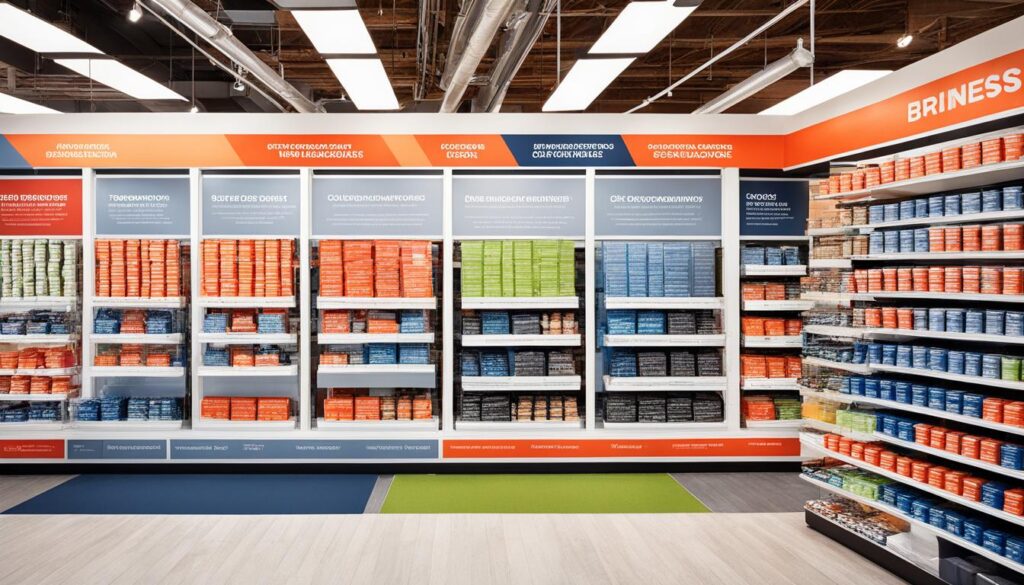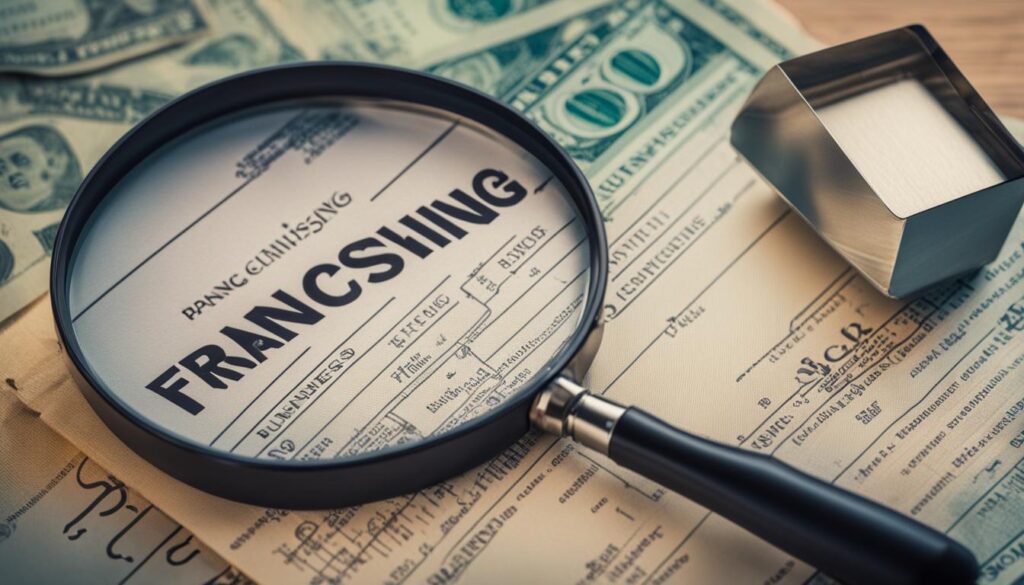Franchising and buying an existing business are two options that aspiring entrepreneurs often consider when venturing into the business world. Both paths have their own unique advantages and considerations. Understanding the key differences between franchising and buying a business can help you make an informed decision that aligns with your goals and aspirations.
In franchising, you purchase the rights to use an established brand’s name, logo, and products. This allows you to tap into the existing success and reputation of the brand. On the other hand, buying an existing business involves taking over ownership of an already established entity, giving you more control over operations and decision-making.
Each option has its pros and cons, and the choice depends on factors such as the level of control you desire, the support and guidance you need, and your overall business goals. To help you navigate this decision-making process, we have prepared a comprehensive guide that delves into the intricacies of franchising and buying a business. Read on to gain a deeper understanding of these options and make an informed choice for your entrepreneurial journey.
Key Takeaways:
- Franchising involves purchasing the rights to use an established brand’s name, logo, and products.
- Buying an existing business offers more control and autonomy but may require more risk-taking.
- Franchising provides support, brand recognition, and established systems.
- Buying a business allows for customization and decision-making freedom.
- Consider factors such as investment capabilities, lifestyle preferences, and due diligence before making a decision.
Understanding Franchising
Franchising is a popular business model that offers entrepreneurs the opportunity to partner with established brands and leverage their success. In this section, we will delve deeper into the concept of franchising, exploring different types and the benefits they bring.
Types of Franchising
There are two common forms of franchising: product/trade name franchising and business format franchising.
Product/trade name franchising:
- Franchisees gain the right to use the franchisor’s brand name and trademark.
- Focuses on supply chain management and product distribution.
- Allows franchisees to tap into established customer bases and brand recognition.
Business format franchising:
- Involves an ongoing relationship between the franchisor and franchisee.
- Franchisees receive comprehensive support such as training, marketing plans, and product supply.
- Offers a proven business model and established systems for successful operations.
Franchising offers numerous benefits for both franchisors and franchisees. Let’s take a closer look at what makes this business model so appealing.
The Benefits of Franchising
| Benefit | Description |
|---|---|
| Brand Recognition | Franchisees can leverage the reputation and brand awareness of established franchises, attracting a loyal customer base. |
| Marketing Support | Franchise systems provide marketing materials, strategic guidance, and advertising campaigns to help franchisees promote their businesses effectively. |
| Established Systems | Franchisors offer proven systems and processes for smooth operations, reducing the risk of failures common in independent businesses. |
| Training and Guidance | Franchisees receive comprehensive training programs and ongoing support from the franchisor, ensuring they have the skills and knowledge needed to succeed. |
| Supplier Networks | Franchisors often have established relationships with suppliers, allowing franchisees to benefit from economies of scale and competitive pricing. |
| Purchasing Power | Franchisees can take advantage of collective purchasing power, securing better deals on inventory, equipment, and supplies. |
Despite the many advantages franchising offers, it’s essential to understand that it comes with its set of rules, regulations, and fees that franchisees must adhere to. Let’s proceed to the next section to explore the alternative option of buying an existing business.
Exploring Buying an Existing Business
Buying an existing business provides a unique opportunity for entrepreneurs to take over ownership of an established venture. Unlike franchising, purchasing an existing business offers more control and autonomy, allowing buyers to make independent decisions and implement their own ideas and marketing strategies. With no franchisor rules to follow or ongoing royalty fees to pay, buying an existing business gives entrepreneurs the freedom to shape the direction of the business to their preferences.
While franchises offer the advantage of brand recognition, buying an existing business may come with more risks and limited brand visibility. However, buyers can leverage the existing customer base, established processes, and potentially industry contacts to propel the business forward. The ability to customize operations and focus on building a unique brand identity can be a significant advantage for independent business owners.
Benefits of Buying an Existing Business
“Taking over an existing business allows entrepreneurs to hit the ground running. With an established customer base and operational systems in place, buyers can focus on refining and growing the business rather than starting from scratch.”
Furthermore, buying an existing business offers the opportunity to make an impact through decision-making. Entrepreneurs can shape the business according to their vision and make strategic choices to drive growth and profitability. The ability to control the business’s trajectory, adapt to market changes swiftly, and respond to customer needs is a valuable advantage for independent business owners.
The Importance of Brand Recognition
While brand recognition may be limited compared to franchises, buyers of existing businesses can leverage the familiarity and trust already established among their customer base. By cultivating and enhancing the existing brand, entrepreneurs can capitalize on the reputation and loyalty built by the previous owner, increasing the chances of long-term success.
| Buying an Existing Business | Franchising |
|---|---|
| More control and autonomy | Follow franchisor rules and guidelines |
| Freedom to make independent decisions | Require compliance with franchise standards |
| Opportunity to customize operations | Operate within a predetermined framework |
| Familiar brand recognition | Established brand strength and awareness |
| Risk and rewards directly tied to decisions | Access to established business model and support |
Ultimately, exploring buying an existing business offers entrepreneurs the chance to take ownership of a venture with established processes and potential growth opportunities. Although it may involve more risk compared to franchising, the ability to exert control, customize operations, and capitalize on existing brand recognition can be tremendously valuable for independent business owners.
Factors to Consider Before Deciding
Before deciding between franchising and buying an existing business, there are several crucial factors that you should take into consideration. These factors include your investment capabilities, talents and lifestyle, and the overall business landscape.
The investment required for franchising and buying a business can vary significantly. Assessing your financial resources is essential to determine which option is more feasible for you. Franchising often involves higher upfront costs such as franchise fees, royalties, and the purchase of equipment or inventory mandated by the franchisor. On the other hand, buying an existing business may require a larger lump sum payment for the acquisition, but you may have more flexibility in managing your ongoing financial obligations.
Another factor to consider is your talents and lifestyle. Franchising typically provides a structured business model with established systems and processes, which can be advantageous for individuals who prefer following guidelines and do not mind the limited decision-making autonomy compared to what an independent business offers. If you have a clear vision and a strong desire for creative control and flexibility, buying an existing business may be a better fit, as it gives you the freedom to implement your own ideas, marketing strategies, and operational procedures.
It’s also important to assess the overall business landscape in your chosen industry or market. Researching the competition, target audience, and market trends can help you identify potential opportunities and challenges. Franchising may provide an edge in terms of brand recognition, established customer base, and proven marketing strategies. However, buying an existing business may already have a loyal customer base and industry contacts, saving you time and effort in building connections from scratch.
Performing Due Diligence
Regardless of whether you choose to franchise or buy an existing business, conducting due diligence is crucial before making a final decision. This involves a thorough examination of various aspects of the business, such as finances, contracts, legal obligations, and compliance with regulations. Hiring professionals like business brokers, accountants, and attorneys can provide valuable guidance and expertise throughout the due diligence process.
Performing due diligence is like investigating a business before committing to it. It helps you uncover potential risks, hidden liabilities, and other essential information that may impact your decision-making.
By evaluating your investment capabilities, talents and lifestyle, and thoroughly assessing the business landscape through due diligence, you can make a well-informed decision between franchising and buying an existing business. Remember, each option has its pros and cons, and it’s crucial to choose the path that aligns best with your goals, aspirations, and resources.
Conclusion
After weighing the pros and cons of franchising versus buying an existing business, it is clear that the decision ultimately depends on your personal goals and preferences. Franchising offers the advantages of support, brand recognition, and established systems that come with being part of a larger corporation. However, it also entails following rules and paying fees.
On the other hand, buying an existing business grants you more control and autonomy, allowing room for decision-making and customization. Nonetheless, it may require taking on more risk and putting in additional marketing efforts to establish and grow the business.
When making this important decision, it is crucial to carefully consider your financial situation, lifestyle goals, and conduct thorough research and due diligence. Consulting with professionals such as business brokers, accountants, and attorneys can help you navigate the decision-making process and make an informed choice.








